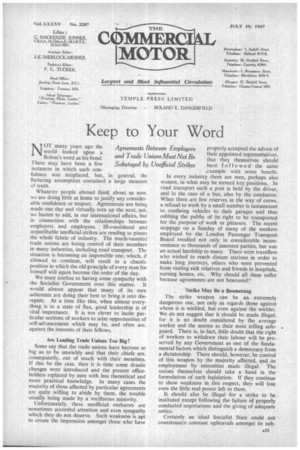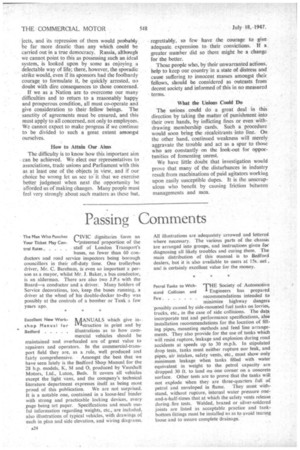Keep to Your Word
Page 25

Page 26

If you've noticed an error in this article please click here to report it so we can fix it.
NOT many years ago the world looked upon a Briton's word as his bond. There may have been a few instances in which such confidence was misplaced, but, in general, the flattering assumption contained a large measure of truth.
Whatever people abroad think about us now. we are doing little at home to justify any considerable confidence or respect. Agreements are being made one day and virtually torn up the next, not, we hasten to add, in our international affairs, but in connection with the relationships between employers and employees. Ill-considered and unjustifiable unofficial strikes are rending to pieces the whole fabric of industry. The much-vaunted trade unions are losing control of their members in many industries, including road transport. The situation is becoming an impossible one, which, if allowed to continue, will result in a chaotic position in which the old principle of every man for himself will again become the order of the day.
-We must confess to having some sympathy with the Socialist Government over this matter. It would almost appear that many of its own adherents are doing their best to bring it into disrepute. At a time like this, when almost everything is in a state of flux, good leadership is of vital importance. It is not clever to incite particular sections of workers to seize opportunities of self-advancement which may be, and often are. against the interests of their fellows.
Are Leading Trade Unions Too Big?
Some say that the trade unions have become so big as to be unwieldy and that their chiefs are, consequently, out of touch with their members. If this be the case, then it is time some drastic changes were introduced and the present officeholders replaced by men with less theoretical and more practical knowledge. In many cases the majority of those affected by particular agreements are quite willing to abide by them, the trouble usually being made by a vociferous minority. Unfortunately, these unofficial outbursts are sometimes accorded attention and even sympathy which they do not deserve. Such weakness is apt to create the impression amongst those who have properly accepted the advice of their appointed representatives, that they themselves should have followed the same example with some benefit.
In every industry there are men, perhaps also women, in what may be termed key positions. In road transport such a post is held by the driver, and in the case of a bus, also by the conductor. When there are few reserves in the way of crews. a refusal to work by a small number is tantamount to confining vehicles to their garages and thus robbing the public of its right to be transported for the purposeof work or pleasure. The recent stoppage on a Sunday of many of the workers employed by the London Passenger Transport Board resulted not only in considerable inconvenience to thousands of innocent parties, but was an actual hardship to many. There were travellers who wished to reach distant stations in order to make long journeys, others who were prevented from visiting sick relatives and friends in hospitals, nursing homes. etc. Why should all these suffer because agreements are not honoured?
Strike May Be a Boomerang The strike weapon can be an extremely dangerous one, not only as regards those against whom it is wielded, but even against the wielder. We do not suggest that it should be made illegal, for it is no doubt considered by the average worker and the unions as their most telling safeguard. There is, in fact, little doubt that the right of workers to withdraw their labour will be preserved by any Government as one of the fundamental factors which distinguish a democracy from a dictatorship. There should, however, be control of this weapon by the majority affected, and its employment by minorities made illegal. The unions themselves should take a hand in the formulation of such legislation. If they continue to show weakness in this respect, they will lose even the little real power left to them.
It should also be illegal for a strike to be instituted except following the failure of properly conducted negotiations and the giving of adequate notice.
Certainly an ideal Socialist State could not countenance constant upheavals amongst its sub jects, and its repression of them would probably be far more drastic than any which could be carried out in a true democracy. Russia, although we cannot point to this as possessing such an ideal system, is looked upon by some as enjoying a delectable way of life; there, however, the sporadic strike would, even if its sponsors had the foolhardy courage to formulate it, be quickly arrested, no doubt with dire consequences to those concerned.
If we as a Nation are to overcome our many difficulties and to return to a reasonably happy and prosperous condition, all must co-operate and give consideration to their fellow beings. The sanctity of agreements must be ensured, and this must apply to all concerned, not only to employees. We cannot expect to make progress if we continue to be divided to such a great extent amongst ourselves.
How to Attain Our Aims The difficulty is to know how this important aim can be achieved. We elect our representatives to associations, trade unions and Parliament with this as at least one of the objects in view, and if our choice be wrong let us see to it that we exercise better judgment when next the opportunity be afforded us of making changes. Many people must feel very strongly about such matters as these but, regrettably, so few have the courage to give adequate expression to their convictions. If a greater number did so there might be a change for the better.
Those people who, by their unwarranted actions, help to keep our country in a state of distress and cause suffering to innocent masses amongst their fellows, should be considered as outcasts from decent society and informed of this in no measured terms.
What the Unions Could Do The unions could do a great deal in this direction by taking the matter of punishment into their own hands, by inflicting fines or even withdrawing membership cards. Such a procedure would soon bring the recalcitrants into line. On the other hand, continued weakness will merely aggravate the trouble and act as a spur to those who are constantly on the look-out for opportunities of fomenting unrest.
We have little doubt that investigation would prove that many of the disturbances in industry result from machinations of paid agitators working upon easily susceptible dupes. It is the unscrupulous who benefit by causing friction between managements and men.




















































































